Catabolic reactions - Study guides, Class notes & Summaries
Looking for the best study guides, study notes and summaries about Catabolic reactions? On this page you'll find 1152 study documents about Catabolic reactions.
Page 2 out of 1.152 results
Sort by

-
Testbank for Biology 2nd Edition from OpenStax College ISBN 9781947172517
- Exam (elaborations) • 57 pages • 2024
-
- $15.49
- 1x sold
- + learn more
Testbank for Biology 2nd Edition from OpenStax College ISBN 9781947172517Chapter 1 1 Figure 1.6 1: C; 2: F; 3: A; 4: B; 5: D; 6: E. The original hypothesis is incorrect, as the coffeemaker works when plugged into the outlet. Alternative hypotheses include that the toaster might be broken or that the toaster wasn't turned on. 3 Figure 1.16 Communities exist within populations which exist within ecosystems. 4 B 6 D 8 C 10 C 12 B 14 D 16 Answers will vary, but should apply the steps of the scienti...
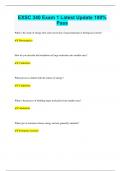
-
EXSC 340 Exam 1 Latest Update 100% Pass
- Exam (elaborations) • 12 pages • 2024
-
- $9.99
- + learn more
EXSC 340 Exam 1 Latest Update 100% Pass What is the study of energy flow and conversion of macronutrients in biological systems? Bioenergetics How do you describe the breakdown of large molecules into smaller ones? Catabolism What process is linked with the release of energy? Catabolism What is the process of building larger molecules from smaller ones? Anabolism What type of reactions release energy and are generally catabolic? Exergonic reactions Which reactions ...
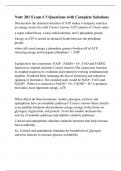
-
Nutr 201 Exam # 3 Questions with Complete Solutions
- Exam (elaborations) • 30 pages • 2024
-
- $17.49
- + learn more
Discuss how the chemical structure of ATP makes it uniquely suited as an energy source for cells Correct Answer-ATP consists of 3 basic units: a sugar called ribose, a base called adenine, and 3 phosphate groups Energy in ATP is stored in chemical bonds between the phosphate groups when cells need energy a phosphate group is broken off of ATP, releasing energy and inorganic phosphate -> ADP Explain how the coenzymes: NAD+, NADH + H+, FAD and FADH2 function in coupled reactions Correct A...
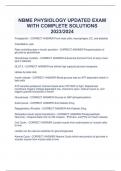
-
NBME PHYSIOLOGY UPDATED EXAM WITH COMPLETE SOLUTIONS 2023/2024
- Exam (elaborations) • 116 pages • 2023
-
Available in package deal
-
- $17.59
- 1x sold
- + learn more
NBME PHYSIOLOGY UPDATED EXAM WITH COMPLETE SOLUTIONS 2023/2024 Prostglandin - CORRECT ANSWER-From mast cells, macrophages, EC, and platelets Vasodilation, pain Rate controlling step in Insulin secretion - CORRECT ANSWER-Phosphorylation of glucose by glucokinase Glucokinase mutation - CORRECT ANSWER-Autosomal dominant form of early onset type 2 diabetes GLUT 2 - CORRECT ANSWER-low affinity high capacity glucose transporter. Uptake by beta cells Insulin release - CORRECT ANSWER-Bloo...
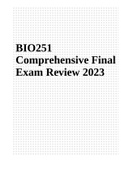
-
BIOS 251 Comprehensive Final Exam Review 2023
- Exam (elaborations) • 61 pages • 2023
- Available in package deal
-
- $15.49
- 2x sold
- + learn more
BIOS 251 Comprehensive Final Exam Review 2023. The following are all levels of the structural organization of the human body: 1. Organ 2. Organ system 3. Tissue 4. Cell 5. Chemical level Arrange the above levels from least complex to most complex: • A. 3, 4, 1, 2, 5 • B. 4, 5, 1, 2, 3 • C. 5, 4, 3, 1, 2 • D. 1, 2, 3, 4, 5 • E. 5, 4, 6, 2, 1 . Feedback: Good work; your answer is correct! Question 2 of 75 1.0/ 1.0 Points Which of the following statement(s) is(are) correc...
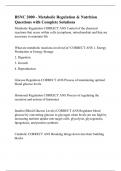
-
BSNC 2000 - Metabolic Regulation & Nutrition Questions with Complete Solutions
- Exam (elaborations) • 23 pages • 2024
-
- $13.99
- + learn more
Metabolic Regulation CORRECT ANS Control of the chemical reactions that occur within cells (cytoplasm, mitochondria) and that are necessary to maintain life What are metabolic reactions involved in? CORRECT ANS 1. Energy Production or Energy Storage 2. Digestion 3. Growth 4. Reproduction Glucose Regulation CORRECT ANS Process of maintaining optimal blood glucose levels Hormonal Regulation CORRECT ANS Process of regulating the secretion and actions of hormones Insulin (Blood Glucos...
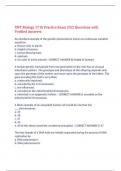
-
UNT Biology 1710 Practice Exam 3|52 Questions with Verified Answers,100% CORRECT
- Exam (elaborations) • 13 pages • 2024
-
- $10.99
- 1x sold
- + learn more
UNT Biology 1710 Practice Exam 3|52 Questions with Verified Answers An excellent example of the genetic phenomenon known as continuous variation would be: a. flower color in plants. b. height in humans. c. human blood groups. d. epistasis. e. fur color in arctic animals - CORRECT ANSWER B) height in humans A human genetic trait passed from one generation to the next has an unusual inheritance pattern. The genotype and phenotype of the offspring depends only upon the genotype of the mo...
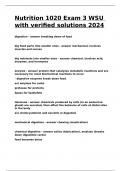
-
Nutrition 1020 Exam 3 WSU with verified solutions 2024
- Exam (elaborations) • 30 pages • 2024
-
- $13.49
- + learn more
digestion breaking down of food big food parts into smaller ones mechanical, involves muscles and nerves Previous Play Next Rewind 10 seconds Move forward 10 seconds Unmute 0:00 / 0:15 Full screen Brainpower Read More big nutrients into smaller ones chemical, involves acid, enzymes, and hormones enzyme protein that catalyzes metabolic reactions and are necessary for most biochemical reactions to occur - digestive enzymes break down food ex) amylase for ca...
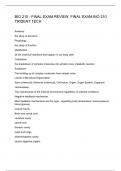
-
BIO 210 - FINAL EXAM REVIEW, FINAL EXAM BIO 210 TRIDENT TECH
- Other • 26 pages • 2024
-
- $13.09
- + learn more
Anatomy the study of structure Physiology the study of function Metabolism all the chemical reactions that happen in our body cells Catabolism the breakdown of complex molecules into simpler ones. Catabolic reaction Anabolism The building up of complex molecules from simpler ones Levels of Structural Organization Atom (chemical), Molecule (chemical), Cell tissue, Organ, Organ System, Organism Homeostasis The maintenance of the internal environment regardless of external conditions ...
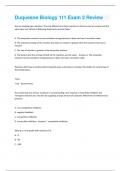
-
Duquesne Biology 111 Exam 2 Review Updated Exam!!
- Exam (elaborations) • 36 pages • 2024
- Available in package deal
-
- $7.99
- + learn more
You are studying two reactions. The only difference in these reactions is that one has an enzyme and the other does not. Which of following statements must be false? A. The enzymatic reaction has less activation energy because it does not have a transition state. B. The activation energy of the reaction that lacks an enzyme is greater than the reaction that has an enzyme. C. The rate of reaction is greater in the enzymatic reaction. D. The delta G and the entropy of both of the reactions a...

That summary you just bought made someone very happy. Also get paid weekly? Sell your study resources on Stuvia! Discover all about earning on Stuvia


